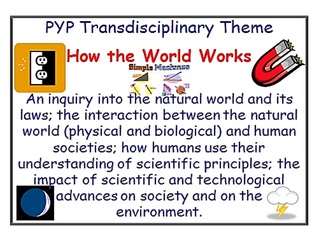Archive for March, 2018
How the World Works

Unit Timeline: March 12- April 24
Central Idea:
Matter exists in three common states and leads to various changes.
Lines of Inquiry:
States of matter
Properties of matter and their importance
How matter changes from one state to another
Key Concepts:
Form
Function
Change
Related Concepts:
Cycle
Attitudes:
Curiosity
Enthusiasm
Learner Profile:
Inquirer
Thinker
ATL:
Research Skills (Formulating questions, Interpreting data, & Presenting research findings)
Thinking skills (Acquisition of knowledge, Analysis, & Evaluation)
Science Strands
Materials & matter
Summative assessment– conducting physical and chemical change experiments
Formative assessment– poster about properties of three states of matter
Specific Learning Objectives:
Gr3.D.1. Discuss that matter has different states (i.e. solid, liquid, gas) and that each state has distinct physical properties; some common materials such as water can be changed from one state to another by heating or cooling
Gr3.D.2. Examine the properties and importance of the materials used for experiments (physical and chemical changes in matter)
Gr3.D.3. Develop their observation skills and reflect on their findings to test and refine their ideas with increasing accuracy
Gr3.D.4. Research, evaluate & draw conclusion from data gathered
Gr3.D.5. Explain the relevance and importance of the various experiments done in the lives of people
Active Living
There are positive and negative outcomes for taking personal and group risks that can be evaluated in order to maximize enjoyment and promote safety
Gr3.D.6. Identify different stages of life and how these can affect physical performance
Identity
Reflecting on the strategies we use to manage change and face challenges helps us to develop new strategies to cope with adversity.
Gr3.D.11. Reflect on how they cope with change in order to approach and manage situations of adversity
Listening and Speaking
Spoken language varies according to the purpose and audience.
Gr3.D.12. Follow multi-step directions
Gr3.D.13. Use language to explain, inquire and compare
Measurement
Object and events have attributes that can be measured using appropriate tools.
Constructing meaning
Gr3.D.14. Understand relationships between units, for example, meters, centimeters and millimeters
Transferring meaning into symbols
Gr3.D.15. Estimate and measure using standard units of measurement: volume (cuboid, rectangular solid)
Applying with understanding
Gr3.D.16. Use standard units of measurement to solve problems in real-life situations involving volume (cuboid, rectangular solid)
Gr3.D.17. Read and write digital and analogue time on 12-hour and 24-hour clock
Gr3.D.18. Find the duration of a time interval
Gr3.D.19. Find the starting time/ finishing time
Gr3.D.20. Solve word problems involving addition and subtraction of time given in hours and minutes
Reading
Wondering about texts and asking questions helps us to understand the meaning.
Gr3.D.21. Recognize and use the different parts of a book, for example, title page, contents, index
Gr3.D.22. Wonder about texts and ask questions to try to understand what the author is saying to the reader
Science Skills
Gr3.D.28. Observe carefully in order to gather data
Gr3.D.29. Use a variety of instruments and tools to measure data accurately
Gr3.D.30. Use scientific vocabulary to explain their observations and experiences
Gr3.D.31. Identify or generate a question or problem to be explored
Gr3.D.32. Make and test predictions
Gr3.D.33. Interpret and evaluate data gathered in order to draw conclusions
Viewing and Presenting
Selecting the most suitable forms of visual presentation enhances our ability to express ideas and images.
Gr3.D.34. Realize that text and illustrations in reference materials work together to convey information, and can explain how this enhances understanding
Gr3.D.35. Realize that effects have been selected and arranged to achieve a certain impact, for example, the way in which colour, lighting, music and movement work together in a performance
Writing
The structure of different types of texts includes identifiable features.
Gr3.D.36. Engage confidently with the process of writing
Gr3.D.37. Use feedback from teachers and other students to improve their writing
Gr3.D.38. With teacher guidance, publish written work, in handwritten form or in digital format
Text Type: Procedural Text
Reading Strategies: Using background knowledge, Questioning, & Synthesizing
ICT Skills: Investigating, Organizing, Collaborating
MS Power Point
Recent Comments